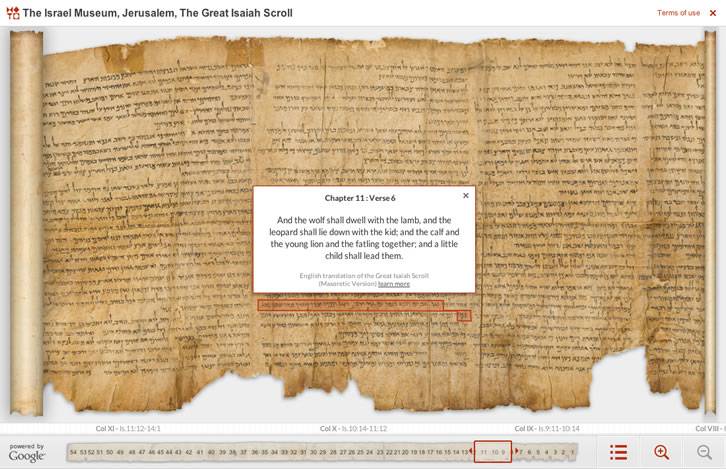In a world increasingly steeped in technology, the preservation of our historical and cultural heritage has transformed. Digitization not only rescues ancient documents from oblivion but also brings them closer to a global audience, democratizing access to knowledge.
Discover the Past: Explore the Dead Sea Scrolls Online
A notable example of this phenomenon is the collaboration between Google and the Israel Antiquities Authority. This ambitious project has digitized over 5,000 images of the Dead Sea Scrolls, offering a window into the past that until recently was accessible to only a select few scholars.
The significance of these manuscripts, which include fundamental biblical texts like the Genesis fragments and the Ten Commandments, extends beyond the religious and historical, opening new avenues for research and understanding of our shared history.
This digitization effort represents a bridge between antiquity and modernity, showing how current technology can illuminate the shadows of the past.
Innovation and Heritage: The Digital Era Renews History
From Scrolls to Pixels: Transforming Antiquity into Digital Access
The collaboration to digitize the Dead Sea Scrolls has marked a milestone in the conservation of historical heritage. Using advanced technology, over 5,000 images of these documents, some dating back over 2,000 years, have been captured.
This process has required not only high-definition equipment and special techniques to protect the delicate scrolls but also an innovative approach to make ancient texts understandable and accessible to today’s audience.
The project demonstrates how technology can overcome barriers of time and space, allowing people around the world to explore these treasures from the comfort of their homes.
Opening Doors to Knowledge: The Digital Library That Unites Worlds
The Leon Levy Dead Sea Scrolls Digital Library is the tangible result of this collaborative effort. This online platform not only facilitates access to manuscripts for researchers and academics but also to the general public interested in ancient history and culture.
Users can explore documents that include some of the oldest biblical texts, such as primitive versions of the Book of Deuteronomy, which contains the Ten Commandments and fragments of the Book of Genesis.
The quality of the images, both infrared and color, faithfully reproduces the details of the manuscripts, allowing visitors to appreciate the beauty and complexity of these historical documents.
The initiative demonstrates the power of technology to open the doors of ancestral knowledge, offering a new way to interact with our collective past.
A Digital Legacy for Humanity: Impact and Future Perspectives
Digital Preservation: A Bridge to Our Past’s Future
The digitization project of the Dead Sea Scrolls has had a profound impact beyond technology and document preservation. These manuscripts are not just ancient pieces of religious and historical literature; they represent a direct link to the past, offering unique perspectives on the evolution of thought, culture and traditions that have shaped current civilization.
By making these documents accessible to millions, the project not only safeguards this treasure for future generations but also invites global reflection on our common roots and the diverse paths human societies have taken.
Digitization allows students, historians and the general public to explore these texts, fostering a new level of interaction and interpretation that was unthinkable in previous decades.
Innovative Partnerships: How Google Is Rewriting History
Google’s role in this project underscores the growing responsibility of tech corporations in the preservation of global cultural heritage.
Through initiatives like the Leon Levy Dead Sea Scrolls Digital Library, Google provides the necessary technological tools for digitization and dissemination of manuscripts and demonstrates a commitment to universal access to knowledge.
This collaboration between government entities, nonprofits and tech corporations sets a model for future conservation projects. It also reflects a broader trend of how technology can serve society, bringing history and culture closer to people worldwide and promoting a deeper understanding of our shared past.
Looking to the Future: Digitization Safeguards Our Common Heritage
The digitization of the Dead Sea Scrolls by Google and the Israel Antiquities Authority represents a significant advancement in how we interact with our past.
This project has not only succeeded in preserving one of humanity’s most valuable historical and cultural treasures but also has established a new standard for accessing ancestral knowledge.
Technology, far from alienating us from our roots, has proven to be a powerful tool for connecting with them, allowing us to explore the richness of human history directly and personally.
The initiative has shown how collaboration across different sectors can yield substantial benefits for all humanity. By opening the doors of knowledge to a global audience, projects like this encourage a greater understanding and appreciation for the diversity and complexity of our cultural traditions.
In a world rapidly moving toward the future, it’s essential to remember and preserve the lessons of the past.
Ultimately, the digitization of these millennia-old documents is a reminder that, despite technological advances and cultural differences, we share a common history. By ensuring that this legacy is available to all, we can hope to build a future where respect for history and culture fosters a more informed, tolerant and united society.





